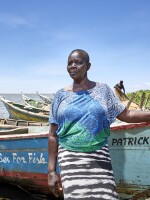
Rebecca Davis
-
Along Lake Victoria, women fishmongers often engage in transactional sex with fishermen — a practice that contributes to Kenya's high rate of HIV. One group is challenging that convention.
-
The U.S. recycling industry is facing a quandary: Too much of the plastic we use can't be recycled, and taxpayers increasingly are on the hook for paying for all that trash to hit the landfills.
-
How can I find out if my plastic waste is really being recycled What makes some plastic recyclable and some not? Here are answers from the NPR correspondents working on "The Plastic Tide" series.
-
After trying one treatment after another for his leukemia, 20-year old Aaron Reid enrolled in a study to test an experimental therapy using modified cells from his own body.
-
Infants do better with their parents, studies find, as long as parents have support to get and stay sober. This program starts during pregnancy, to rally and train a strong family support network.
-
Nervous mothers and dads once had only family and friends to turn to for advice on kids. Then, in 1912, the U.S. government created an agency devoted to children, and queries from moms poured in.
-
African-American women are more likely to lose a baby in the first year of life than women of any other race. Scientists think that stress from racism makes their bodies and babies more vulnerable.
-
"You must leave now," thousands of Americans from Puerto Rico to Oregon to Florida, Montana, Texas and beyond were told, as floods, fire and wind threatened their lives. Some said no.
-
In Leipzig, Germany, two scientists from very different backgrounds are working on a unique research project.
-
Carmen Bachmann, a professor in Leipzig, is building an online network to help political refugees who are scientists or social scientists connect with professional peers in Germany — their new home.









